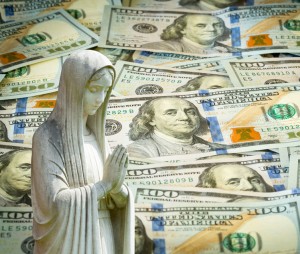Rules Are for Schmucks: How Religion Makes Its Money

The God industry makes most of its money by selling psychological comfort. People are able to enhance their self-esteem by participating in an activity that the conventional wisdom endorses, whether or not it provides any actual benefit for the participant’s “soul” or for anyone else. The last couple of months, though, have seen a variety of news items about novel ways in which money-hungry God experts feed their appetites.
Fraud, Scandinavian style
In Norway, as in some other European countries, the God industry has lobbied its way out of reliance on the free market and into the cushy world of government subsidy. The Kingdom of Norway collects taxes from everyone, including nonbelievers, then hands that money over to various religious enterprises. The amount to give each denomination is based on a simple head count—supplied by the denomination itself.
A forensic CPA may have spotted a weakness in this arrangement already. It wouldn’t take Sherlock Holmes, though, to find it curious that the number of Catholics in Norway somehow managed to double between 2010 and 2014, at a time when the rest of European Christianity is in headlong retreat.
How did the Norwegian Catholics manage to achieve this stupendous achievement? Better sermons? Free beer? No. They simply added new Catholics to their list by going through the telephone directory, finding names of thousands of immigrants that sounded Catholic (e.g., immigrants from Poland), and then automatically added them to the money list—without the person’s knowledge.
The police call this practice “aggravated fraud.” However, we know that it’s not fraud because the Oslo diocese itself has issued a report saying that it isn’t. And they wouldn’t lie, would they?
Fraud, Dearborn style

Ahmad Jebril (Photo courtesy U. S. Probation Office for Eastern District of Michigan)
Ahmad Jebril is one of the leading American supporters of the Islamic State. His web rants have been cited as an inspiration by English-speaking fighters for the cause of decapitating Christians. One can only imagine what they might do if they ever catch someone who admits to being an atheist.
Where does he get all the money for this campaign? It’s hard for him to find financial support among US Muslims, the overwhelming majority of whom have no use at all for the Islamic State. Last month Jebril was in the news again, being ordered by a judge to answer questions about his finances after he invoked his Fifth Amendment right against self-incrimination over two hundred times during a deposition.
It turns out the centerpiece of Jebril’s original business plan was insurance fraud. He served six-and-a-half years in jail for deliberately trashing properties in order to collect on insurance policies, then using the money to serve God in his own special way. He still owes more than $242,000 in restitution for these crimes.
One of the benefits of declaring war on the Islamic State would be to clarify that anything further Jebril does on its behalf would be treason. Apparently, though, our useless Congress cannot get its act together to take this simple step.
Kidnapping
A far more important source of Islamic State funding than American contributions is the kidnapping and holding for ransom of hostages. The UN says this earned them thirty-five to forty-five million dollars last year. But kidnapping isn’t just a revenue source for overseas Muslims—it works for American Jews as well.
Under Jewish law, a husband may divorce his wife, but a wife may not divorce her husband. This comes straight out of the Bible, and is one of the many reasons for the daily prayer of devout Jewish men: “Blessed are you, Lord, our God, ruler of the universe who has not created me a woman.” If a husband loves his wife—or hates her—so much that he refuses to grant a divorce, there is simply no procedure available that will allow her to marry someone else without being treated as a sinner by the rest of her congregation.
Well, except for one. New Jersey rabbis have taken to raising money by kidnapping recalcitrant husbands and torturing them until they develop an appreciation for God’s will. In one recent case, a woman’s lawyer testified that he wired $60,000 to Rabbi Mendel Epstein’s congregations. Epstein and two thugs then proceeded to seize her husband and torment him until he signed the divorce paper. Evidence presented in Epstein’s trial shows that his team used surgical blades, a screwdriver, rope, handcuffs, and even an electric cattle prod to help preach God’s word to the husband. When the FBI sent in an undercover agent to investigate, Epstein was caught on a hidden camera quoting the same $60,000 fee, and boasting that “If [the cattle prod] can get a bull that weighs five tons to move, you put it in certain parts of his body and in one minute the guy will know.” In one case, according to Epstein, a husband he was persuading suffered a heart attack.
On Tuesday, Rabbi Epstein was convicted of the federal crime of conspiracy to commit kidnapping, a federal offense. His accomplices, Rabbi Binyamin Stimler and Rabbi Jay Goldstein, were convicted on both conspiracy to commit kidnapping and attempted kidnapping. Attorneys for the three rabbis immediately announced their plans to appeal. It is likely the appeal will include an argument that their actions are protected by the Religious Freedom Restoration Act, a defense the trial judge would not allow them to assert.
Amulets
The contempt for women in Judaism exists in most other religions as well, especially Islam. It was therefore easy to dismiss the latest case in Afghanistan of Muslim men publicly beating to death a woman accused of blasphemy, while police calmly stood by, as simple misogyny. There is more to it than that, though.
The victim, a woman named Farkhunda, was actually a prominent scholar of Islam. Far from being a blasphemer who would burn a Qur’an, she was intent on spreading its message. These efforts threatened the livelihood of other competing Muslim God experts who sell magic amulets they claim can protect purchasers from evil. Amulet sales are big business in the Muslim world, but Farkhunda was certainly correct that they are contrary to mainstream Sunni theology. When one God expert disagrees with another, there is really no way to determine which one is correct—the scientific method doesn’t usually work with theology. But when one God expert menaces another’s source of money, all kinds of bad results can ensue.
Legal is Better
A plot element in The Godfather films is Michael Corleone’s effort to move the family into more legitimate businesses, which turns out to be harder than it sounds. The Catholic Church in Newark, New Jersey, has the same problem. When Catholics there die, their families shell out lots of money to private firms for funeral homes and headstones. Why shouldn’t they pay this money to the church instead, which can provide exactly the same service?
An economist would argue that having more firms enter a market can only be good for consumers. That’s generally true, but when the new entrant is a tax-exempt entity, it can press that advantage to the long-term detriment of everyone (except itself). The huge amounts of money saved by not paying taxes can be used to increase marketing and cut prices in ways that force other players out of business. In fact, the church’s share of the headstone market jumped from zero to 36 percent in just two years. When the New Jersey legislature saw that this was starting to affect taxpaying businesses, some of them family-owned for generations, it took action. Now, of course, the church is whining about “intrusion into religious freedom,” despite the fact that it’s free to sell all the headstones it wants if it does so via a regular taxpaying business. New Jersey, though, is one of the twenty-nine states that does not yet have a Religious Freedom Restoration Act (RFRA), so the church has not much legal leg to stand on.
It’s possible the Newark archbishop was inspired by the example of the church-owned hotel across the Hudson in Manhattan. If you’ve ever stayed in a New York City hotel, you undoubtedly remember not just the staggering room rate, but the 14.75 percent tax that gets piled on top of that. Unless, that is, you have the good sense to stay at the eight-story Leo House on 23rd Street, a church-owned boutique featuring Wi-Fi, flat-screen TVs, and a Vatican flag in the lobby to get you in a spiritual mood. Thanks to some clever lobbying, Leo House customers do not have to pay that 14.75 percent tax, giving it a huge price advantage over its nearby competitors.
Who says there is no such thing as a miracle?
